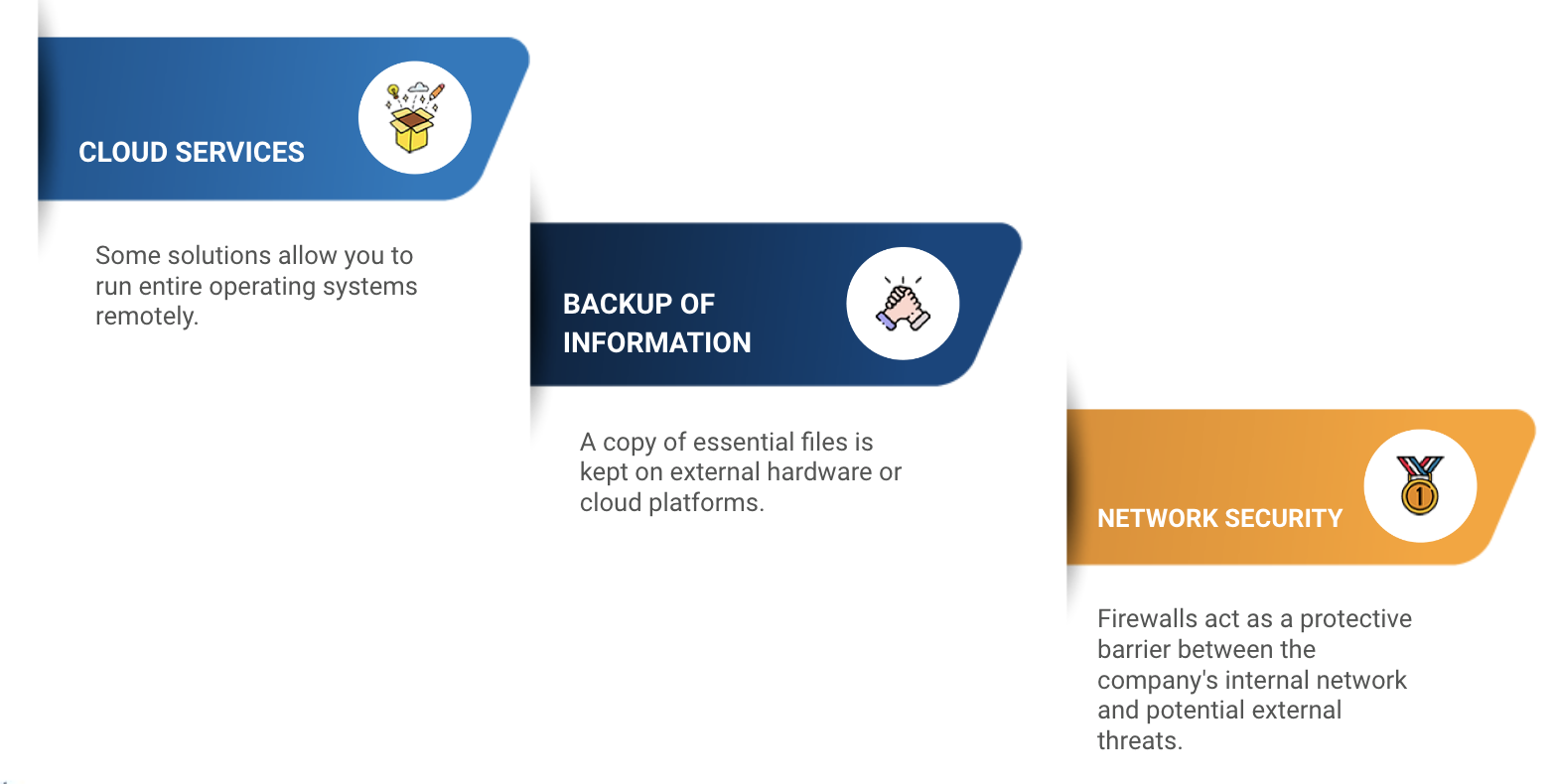
Types of IT services you can hire
October 03, 2024
Table of contents
Quick Access

Information technology (IT) has become a key pillar for the success of companies. CEOs, managers and business leaders are faced with the need to improve their operations, optimize information security and adapt to a more flexible work environment.
This is where IT services come into play, offering solutions tailored to the needs of each business. We review the main types of IT services that companies can hire to improve their business.
Types of IT services you can hire
1. Cloud Services
Cloud services have revolutionized the way companies access and store information. The cloud, a platform connected to the internet, allows team members to access the necessary data and programs without depending on specific physical devices. With the cloud, it is possible to work both from the office and from home, which facilitates remote work and collaboration between geographically dispersed teams.
Cloud services offer several key advantages:
- Remote access to internal systems: Some solutions allow you to run complete operating systems remotely, which means that employees can access business programs from any device without having to install them.
- Reduced infrastructure costs: Companies no longer need to invest large sums in physical servers, since cloud services provide scalable storage and processing.
- Flexibility and scalability: As the business grows, it is easy to increase storage capacity or add new functionalities without the need to purchase additional hardware.
For companies looking for an efficient and cost-effective solution, cloud services are a strategic option.
2. Data Backup Solutions
Data loss can have devastating consequences for any business. From production disruptions to damage to the company's reputation, the risks associated with data loss are considerable. For this reason, data backup solutions offered by IT service companies are essential to protect business data against any contingency, such as system failures or power outages.
Data backup solutions include:
- File backup: A copy of essential files is saved on external hardware or cloud platforms.
- Server backup: Protects critical information stored on company servers, ensuring that it is available in the event of any eventuality.
- Desktop device backup: It is also possible to back up information stored on desktop computers and laptops, ensuring that local data is protected.
These solutions not only ensure data security, but also allow businesses to schedule automatic backups so that the most recent version of the information is always maintained.

3. Network Security
In the digital age, network security is one of the main challenges facing companies. Cyber threats, such as malware attacks, unauthorized access, or information theft, are constantly increasing. To protect against these risks, companies can hire network security services.
Common security services include:
- Creating firewalls: Firewalls act as a protective barrier between the company's internal network and potential external threats.
- Installing antivirus software: Up-to-date antivirus software can detect and remove malicious software before it causes damage.
- Implementing virtual private networks (VPNs): VPNs allow employees to connect to the company network securely, even when working from remote locations.
- Regular audits and maintenance: Regular checks ensure that the network is always protected from vulnerabilities.
With a secure network, companies can focus on their growth and operations, knowing that their information is safe from external threats.
4. System Monitoring
System monitoring is an essential IT service to ensure that the company's technology operations are running smoothly. This service involves continuous monitoring of the company's network, internet traffic, devices, and operating systems, with the goal of identifying potential problems before they impact operations.
The benefits of monitoring include:
- Proactive problem detection: Monitoring services identify hardware or software failures, allowing IT teams to make necessary repairs before significant disruptions occur.
- Update management: Software updates are essential for performance and security, and monitoring ensures that all machines are up to date.
- Controlling access to information: Monitoring services also help control who has access to company data, reducing the risk of unauthorized access.
This service not only optimizes the functionality of the technology infrastructure, but also increases operational efficiency and reduces downtime.

5. Hardware and Software Support
Hardware and software are crucial components for the daily operations of any business. From installing and configuring computers, printers, and routers, to maintaining and repairing equipment, businesses rely on the smooth operation of their technology infrastructure.
Hardware and software support encompasses:
- Equipment maintenance and upgrades: IT service providers help businesses keep their equipment up and running by repairing or replacing faulty hardware.
- Software installation: They ensure that businesses use the latest versions of necessary software and that licenses are up to date.
- Custom software development: Some companies also need tailored solutions that fit their specific needs. Custom software development can help automate processes, improve efficiency, and reduce costs.
In addition, software asset management (SAM) solutions can optimize costs by identifying unused or redundant licenses, ensuring that businesses only pay for what they really need.
6. Mobile Device Management
It is now common for employees to use their own mobile devices for work. While this can increase flexibility, it also introduces security risks, as personal devices may not have the same protection measures as company equipment.
Mobile device management (MDM) service helps companies implement security policies on employee devices. Its functions include:
- Data access control: Administrators can control what data can be accessed from personal devices.
- Remote device wipe: In the event of loss or theft, data can be remotely deleted to prevent unauthorized access.
- Enforcement of security policies: MDM allows specific rules to be applied to protect company information on external devices.

7. Data Storage and Management
Efficient data storage and management are critical to business success. Companies handle large volumes of data that need to be stored securely, accessibly and organized.
Data storage and management services include:
- Server and database configuration: IT service providers can help companies set up infrastructures that allow them to manage their data efficiently.
- Access strategies: Solutions are developed that allow data to be accessed quickly, improving business productivity.
- Backup solutions: Critical data is backed up regularly to ensure that in the event of loss or failure, it can be restored without difficulty.
These services not only protect information, but also improve access and efficient use of data, allowing companies to focus on other key areas of their business.
We recommend you this video
Related Blogs

Why are digital signatures secure?

How can I create a digital signature?

How do digital signatures work?

Differences between digital signature and electronic signature

Clone of Why implement a process management solution?
.jpg)
